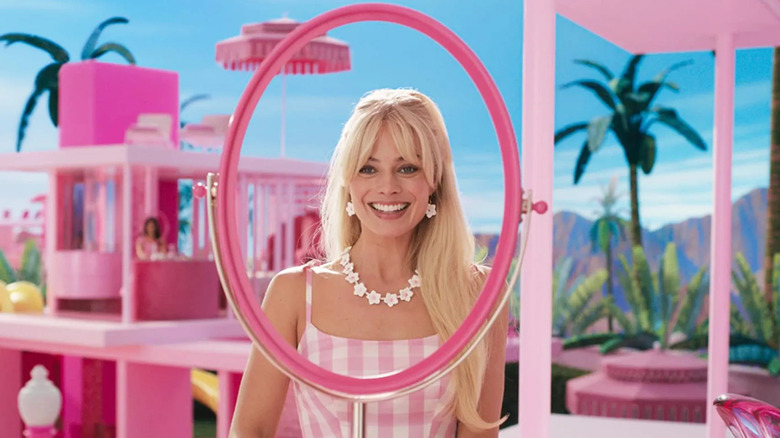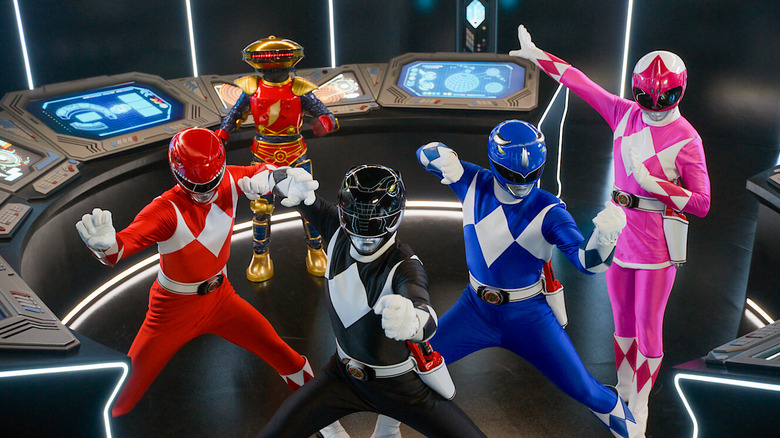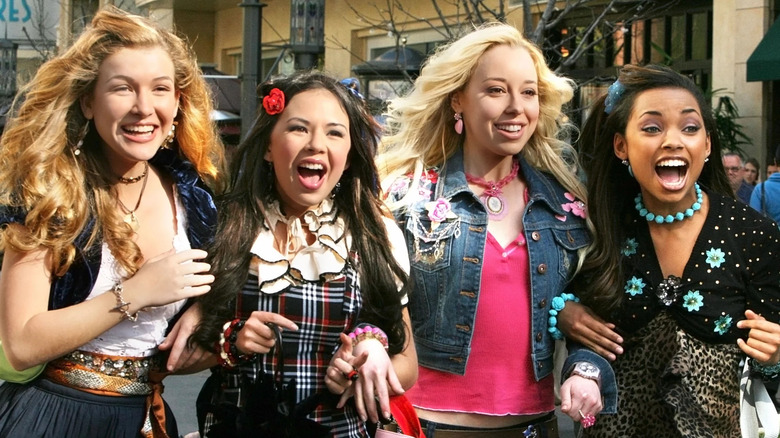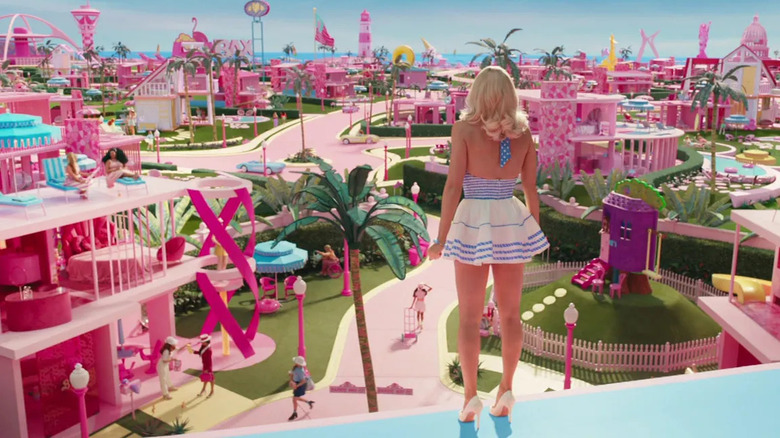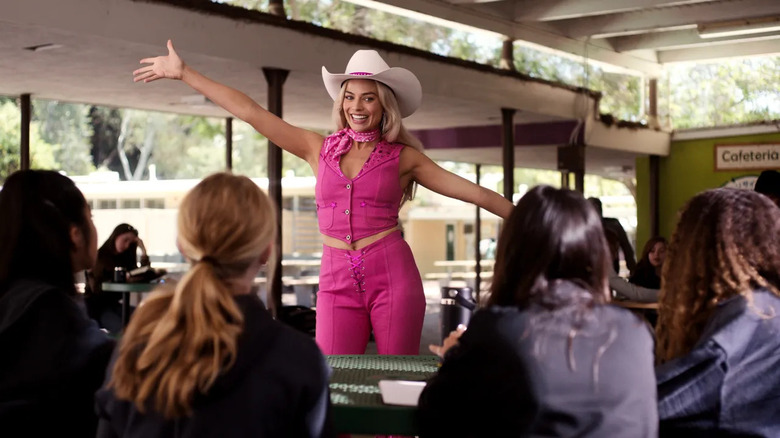Greta Gerwig's Barbie Breaks Every Single Hollywood Rule About 'Toy Movies'
This piece was written during the 2023 WGA and SAG-AFTRA strikes. Without the labor of the writers and actors currently on strike, the movie being discussed here wouldn't exist. This article also contains spoilers for "Barbie."
I was a casual Barbie girl growing up. I recall having a couple of dolls as a wee one and marveling at Barbie's a little-too-perfect beauty. Bratz were more my jam, as they were marketed as the diverse, grown-up, spunkier version of the all-American image of Barbie. It could be argued that all American girl dolls were created to either follow or respond to Barbie's template, and as time went on, girls (I'm generalizing with "girls" because of that pesky ol' gender binary) had their pick of which doll line they resonated most with. But even as doll variations have become more "mature," eclectic, and malleable to changing trends, something inevitably happens to the girls that play with them.
They grow up.
At a certain age, it's no longer cool or even socially acceptable for women to play with dolls or consume related media. "Girls mature faster than boys," and all that. I put my Bratz down for the final time at about 12, and I distinctly recall feeling as if even that age was holding on too long.
But why did I feel that way? Despite boys in my grade and older still proudly holding onto film and TV versions of their childhood heroes?
The boy toys
Little boys have their own dolls — or "action figures," the masculinized term that society has forced us to call them — to play with. G.I. Joe, Transformers, Power Rangers, Batman, Superman, Legos, and more. But unlike girls, when boys outgrow toys, they can move on to collecting "figurines" to build. They can collect comics. They can even watch big-budget film and TV adaptations of their favorite toys. From the '80s until now, nearly every significant boy-marketed franchise has had new life breathed into it in the form of live-action films. High-profile actors from Michael Keaton to Chris Pratt have become the fully realized adult versions of beloved boy heroes.
Marvel specifically has worked to perfect its mass appeal, incorporating comedy that children can engage with as well as nuanced themes for adults. They've managed to imbue an emotional gravitas to the stories of Iron Man, Captain America, Black Panther, and more that now-adult male fans of these heroes can ponder. They changed the game of superhero adaptations for the mainstream, challenging all creators of "nerd" media to meet their standards. Most importantly, they figured out there was a market for speaking directly to men who were not ready to let the playthings of their youth go. Even before Marvel's rise, we had Sam Raimi's "Spider-Man" trilogy, Christopher Nolan's "Dark Knight" trilogy, and Michael Bay's "Transformers," a franchise that's still going strong 16 years on. All boy toys, all the time, at the box office.
Binary expectations
I should take time to stress that the reverie for childhood fixations is not inherently bad. Yet when it comes to this reverie for men, it does not exist in a vacuum. It fits within the larger, accepted narrative around men's arrested development. It compounds their generally assumed lack of emotional intelligence and unequal share of domestic responsibility in partnerships with women. Altogether, these tendencies create the reality that men don't have the same pressure to mentally mature as women do. If you know a college-aged man who lives in a messy apartment, littered with "Dark Knight" posters and pizza boxes, you chalk it up to his masculine nature. If you know a college-age woman who has a messy apartment with Sailor Moon posters and laundry strewn about, you look at her like she has three heads. She shouldn't be so lazy, we say.
Women are forced into the binary of infantilization or adultification, and our media reflects this. Any media about girlhood toys are marketed exclusively to little girls or teen girls. The only attempt I can recall of a girls' toy getting the live-action treatment was 2007's "Bratz: The Movie," but it was marketed to teen girls. It was nowhere near the scale of "Barbie," and even I had no interest in watching it. As we grow into women, we're socialized to enter adulthood by turning our backs on innocence. We're made to feel that we must slam the door on our loves before puberty in favor of dating, makeup, gossip, and household responsibility. Men are given the privilege of holding onto their boyhood, whether that's wearing superhero tees or simply never reaching emotional maturity. Women are not; we are adultified as girls to prepare us for our assumed future roles as caregivers to men and children.
Let's go (to the movies), girls
Considering that reality, to see "Barbie" hit theaters feels earth-shattering. Finally, a film for us.
"Us" being women and femmes and our inner children who were shamed for our girly interests. It's no wonder we left our dolls behind so abruptly; even when we were the "appropriate" age for playing with them, we were always reminded of how inferior these toys were. Though not widely encouraged, it was still somewhat acceptable for girls to play with "boy" toys — but boys were steered vigorously away from playing with any toy deemed "for girls" for fear of being labeled as one. As kids, we got the message loud and clear: boy things are good, potentially neutral interests; girl things are marked negative and childish. Even now, as "Barbie" debuts to raucous applause, men are rushing to minimize the film's validity in going head-to-head with the more masculine "Oppenheimer." Could it be ... fear that a film for the girls could come out decisively on top of a gritty, Christopher Nolan film?
Seeing artists whose work I respect like Margot Robbie, Dua Lipa, Issa Rae, and Mark Ronson be prominently involved with "Barbie" is validating. It tells the inner children of all genders that loved feminine dolls that, yes, Barbies can be cool. Even if the marketing campaign and various unrelated licensing deals have been criticized as excessive, there are plenty of fans salivating over every new promotional drop. After a long drought of opportunities to rep a childhood favorite, grown-up Barbie fans are reveling in this spotlight moment. Seeing everything from gaming consoles to high heels dripping in signature Barbie pink affirms the countless identities that fan "Barbies" grew up to inhabit — just like the vastness of identities the Barbie doll has had over the years.
Reclaiming what's ours
Barbie's impact on the construct of femininity, for better or worse, is immeasurable and worth exploring in adulthood. Like the men who sit religiously through every Marvel and DC film, women deserve to take a piece of their childhood with them as they age. Given the unrealistic expectations society sets forth for women — in part because of Barbie — it's the least Hollywood could allow women to do: reclaim our girlhood.
Because for the younger versions of ourselves, Barbie was everything — good, bad, and somewhere in the gray area. Our relationship with her may have grown distant or complicated as we aged, but the debut of this film invites us to remember her, to reawaken the dormant child within us that was left ignored by Hollywood for decades. No matter if you love or hate Barbie, when asking yourself if she warrants the amount of hype this film has provided her, I hope the answer is clear:
For all that she has given us, she absolutely is worth it.
